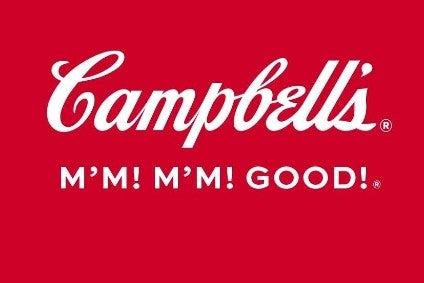
Campbell Soup Co. has cut its full-year sales guidance to reflect the recent disposal of the European snacks business to Italian confectionery giant Ferrero but saw some positive developments in the beleaguered soup category.
New York-listed Campbell has offloaded a number of assets this year falling within its international business units as the US-based FMCG heavyweight seeks to refine operations around the North American market.

Discover B2B Marketing That Performs
Combine business intelligence and editorial excellence to reach engaged professionals across 36 leading media platforms.
As a result of its divestiture of Denmark-based snacks business Kelsen Group, enacted during the summer, Campbell now predicts meagre sales gains for the year and even possibly a decline, having previously painted a positive outlook in August. The picture for organic sales and EBIT remains unchanged, however.
Annual sales are now seen down 1% to up 1%, versus the prior forecast of growth around the 1% to 3% area.
The new guidance was provided with the first-quarter results to 27 October, with both reported and organic sales dropping 1% to US$2.18bn due to a decrease in the meals and beverages segments (-3%) . But a positive performance in snacks (+2%) made up for some of those declines.
While soup sales fell 3%, chief executive Mark Clouse was more sanguine about positive developments in the category during the quarter, namely a gain in market share for the first time in ten quarters, raising future hopes for the long-pressured segment.

US Tariffs are shifting - will you react or anticipate?
Don’t let policy changes catch you off guard. Stay proactive with real-time data and expert analysis.
By GlobalData“Our brands grew or held share in categories representing more than 80% of our total business,” Clouse told analysts on a follow-up conference call. “While the impact of the timing of Thanksgiving shipments was most pronounced on soup, where our condensed varieties and broths play a sizeable role in many holiday recipes, we are making encouraging progress in market on the business. We are injecting much needed investment and continuing to strengthen important retailer relationships while also rationalising the portfolio.”
He said the soup category grew or maintained share across the condensed, ready-to-serve and broth categories – “one of the early indicators of progress on our three-year journey to revitalise US soup.”
Clouse continued: “With each month of progress, we are laying the foundation for the sustainment of the category, and next year, with more innovation, the aim is to ultimately expand the category. In summary, I feel good about the direction in which we are headed on soup.”
Meanwhile, newly-installed finance chief Mick Beekhuizen, a former executive at US dairy business Chobani, said recent disposals – including the Australia-based biscuits brand Arnott’s – have enabled Campbell to pay down debt and cut leverage. He also hinted at further asset sales.
Net debt fell $1.5bn to $8.2bn.
“We expect to complete the remaining divestiture of Arnott’s and certain other international businesses in the second quarter of fiscal 2020 and we will use the net proceeds to further reduce our debt level,” Beekhuizen told analysts. “With our current outlook, we expect our net debt to adjusted EBITDA ratio to be well below four times by the end of fiscal 2020.”
He added that the divestiture of the European snacks business will have a negative impact on sales for the rest of the year of around two percentage points but no impact on adjusted EBIT or adjusted EPS.
The EBIT outlook remains at 2% to 4% growth, while adjusted EPS should register a positive 9%-11% to $2.50-$2.55 a share.
For snacks, Clouse said the category is maintaining momentum, with the consumption metric up almost 4% in the first quarter.
“I’m very excited by the progress and potential of our snacks business,” he said. “I continue to view it as a unique advantage and differentiated portfolio that is responding well to our investments.”





